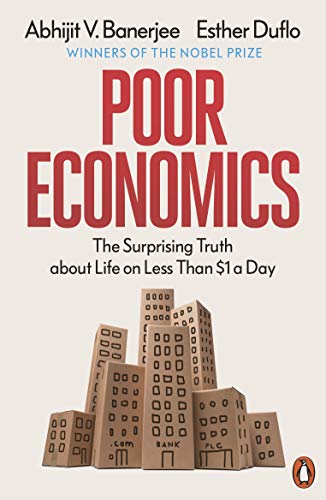poor economics
Abhijit V. Banerjee; Esther Duflo
BOOK REVIEW

In a world where economic theory often feels detached from reality, Poor Economics emerges as a powerful call to action. Written by Nobel laureates Abhijit V. Banerjee and Esther Duflo, this groundbreaking book challenges the mainstream views on poverty with a sharp, poignant lens that forces readers to confront uncomfortable truths about global economic systems. Through meticulously conducted research and compelling narratives, the authors unpack the complexity of poverty and reveal why simplistic solutions often fail.
The thrilling premise of Poor Economics is that poverty is not merely a failure of resources, but a labyrinth of human behavior and decision-making intricately woven into the fabric of everyday life. Banerjee and Duflo expose the fallacies of broad economic policies that ignore the variability of individual circumstances, compelling us to rethink our preconceived notions about the poor and their choices. Each chapter brims with stories-vivid snapshots of lives where every decision becomes a matter of survival. Through the lens of field studies conducted across various developing countries, the authors illuminate the often overlooked reasons behind financial choices that confound policymakers and outsiders.
As you navigate through the pages, it becomes increasingly clear that this is not just an academic exercise; it is a clarion call for empathy and understanding. The authors dive into topics such as education, health care, and microfinance, all while dismantling the myth that the poor lack the capability to improve their own circumstances. Instead, they brilliantly highlight how external factors, such as access to information and social networks, drastically influence the decision-making processes of low-income individuals. 🌍
Readers are captivated by Banerjee and Duflo's rich storytelling, often finding themselves reflecting on their own biases and assumptions about wealth and poverty. But this is not merely a feel-good narrative; it's a passionate plea for actionable insights. With academic rigor, the authors urge us to see the poor not as passive victims, but as active agents of change. Their research challenges us to rethink charity, advocating for local insights and interventions that cater to the unique challenges faced by different communities.
Critically engaging with this work, many readers express a sense of urgency. It's difficult not to feel the weight of the status quo pressing down as you realize that countless lives are shaped not by simple decisions, but by systemic failures. Yet, amidst their revelations, the authors manage to infuse a sense of hope, urging us to embrace complexity rather than shy away from it. The book is peppered with reflections that linger long after the last page-the profound realization that understanding the poor is not just an academic goal, but an ethical obligation.
Yet, as with any profound work, Poor Economics has its critics. Some argue that it presents a overly optimistic view of local solutions. Others ponder if the case studies really apply to broader economic policies. But rather than dismissing these critiques, the authors invite deeper engagement. They challenge us to see these arguments as part of a larger discourse on poverty, highlighting the necessity for continuous questioning and adaptability in tackling the nuances of economic hardship.
In our increasingly interconnected world, where the gap between rich and poor continues to widen, the insights from Poor Economics could not be more vital. The authors have spoken not just to economists but to every individual who believes in justice and equality. They awaken a responsibility within us to demand better from our leaders and innovatively engage with our communities.
If you feel a twinge of discomfort while reading, that's precisely what Banerjee and Duflo aimed to evoke. They want you to rise from your seat, armed with a new perspective, and ready to challenge the unjust structures that perpetuate poverty. This book doesn't just describe the world; it beckons you to change it. So, pick it up and let it transform the way you think about economics, social justice, and humanity itself. You'll find, as others have, that it's not just a book-you'll feel it as an awakening.
📖 poor economics
✍ by Abhijit V. Banerjee; Esther Duflo
🧾 303 pages
2012
#poor #economics #abhijit #banerjee #AbhijitVBanerjee #esther #duflo #EstherDuflo